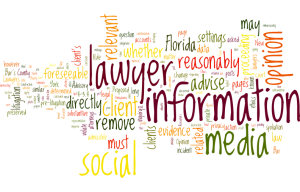 Are Attorneys Allowed to Advise Clients to Clean Up Social Media Profiles? Social media has become a major source of discovery in litigation cases, we freely expose our life through visual platforms like Facebook, Instagram, Pinterest, Twitter without thinking about potential consequences until… we are part of a lawsuit.
Are Attorneys Allowed to Advise Clients to Clean Up Social Media Profiles? Social media has become a major source of discovery in litigation cases, we freely expose our life through visual platforms like Facebook, Instagram, Pinterest, Twitter without thinking about potential consequences until… we are part of a lawsuit.
The question then becomes, can we or should we clean up out profiles? Personally, and this is not legal advice, I advise in my workshops to avoid posting anything they would not want their mother, a potential employer or university to see.
Self censorship is probably the first thing to think about when posting on social media.
Now, that’s a preventive approach, most, unfortunately do not think about it and when part of a lawsuit go into curative mode trying to clean up their postings of potentially damaging postings.
I cannot tell you if it is legal or not, I am not an attorney, but I will assume that removing postings material to a law suit is probably not legal.
Keep in mind that even though you are removing them, they don’t disappear, they are still on servers somewhere, owned by the social media platform or on other users’ walls if they have commented or liked the posting, especially if you tried to clean your postings prior to the legal proceedings and can be subpoenaed
More importantly, are Attorneys Allowed to Advise Clients to Clean Up Social Media Profiles. Their position was murky too, they are probably seeing a lot of postings on clients profiles that led them to roll their eyes or pull their hair.
Could they or could they not advise their clients to change their profiles to “private” to keep potentially damaging information away from the other party? Could they advise their clients to remove potentially damaging postings or photos?
A new opinion from The Florida Bar sheds some light on what is or is not allowable. In the opinion of the Bar, lawyers are allowed to take preemptive steps to avoid mishaps and. L permits attorneys to counsel clients to change privacy settings on and remove information from social media accounts prior to litigation, so long as such action does not violate substantive rules or laws and the data is preserved.
Bottom line, better safe than sorry, think twice before posting something, it could come back to haunt you.
